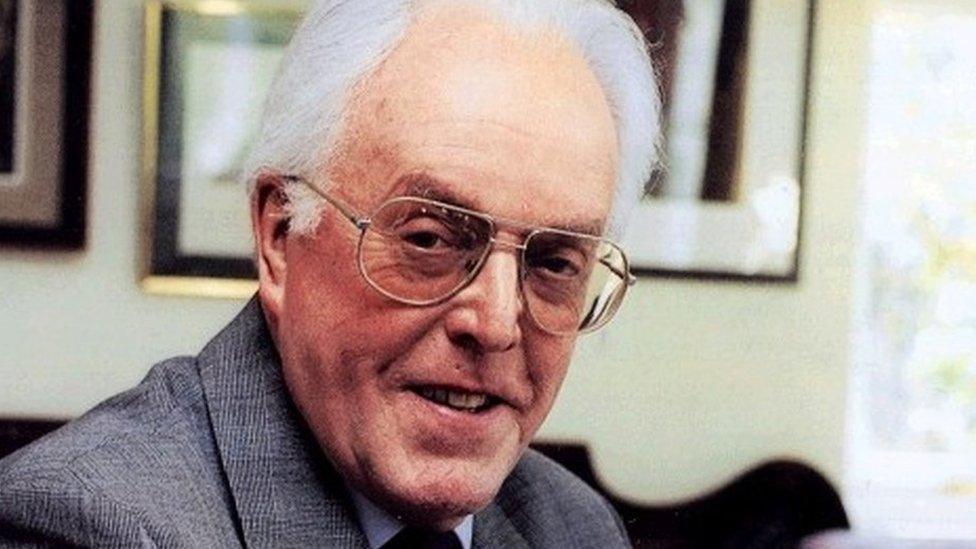Actor and campaigner Lord Rix dies aged 92
- Published

Lord Rix opposed the Assisted Dying Bill in 2006
Actor and disability campaigner Lord Rix has died aged 92, his family said.
The president of the learning disability charity Mencap had been terminally ill and urged Parliament to change the law on assisted dying.
He had previously opposed an assisted dying law, but said his illness had left him "like a beached whale" and in constant discomfort.
As Brian Rix, he performed on stage and TV, specialising in a series of post-war "Whitehall farce" comedies.
For more than 30 years his farces, which starred the likes of comic greats Tommy Cooper and Sid James, were hits on TV and stage, and earned Rix the reputation for his trousers always falling down.
Reforms
It was after his eldest daughter was born in 1951 with Down's syndrome that he began campaigning for people with learning disabilities.
From 1980 to 1988 he was secretary general of Mencap, becoming chairman in 1988 and then president 10 years later - a role he occupied until his death.
In 2006 short breaks for carers became Law - an issue he had been lobbying on for 12 years. In the same year he introduced amendments to the Childcare Bill, which extended childcare provision for disabled children from 16 to 18.
His work on the 2006 Electoral Administration Bill also led to people with a learning disability being able to vote.
The crossbench peer voted against an Assisted Dying Bill in 2006 because of concerns that people with learning disabilities might become the unwilling victims of euthanasia. But his own experience of dying led him to change his position.

Obituary: A master of farce and leading disability campaigner

Brian Rix (left) appeared with Terry Scott in 1965's wartime drama Women Aren't Angels
Rix quit performing in 1977, bowing out during an emotional evening at the Whitehall where he ended a period of 26 years of live performances, both at the Whitehall and at the Garrick to which he had transferred his productions in 1967.
He was still a partner in a production company which put on a number of hit shows in the West End.
But… an increasing amount of his time was being spent campaigning on behalf of people with learning difficulties, something that had started with the arrival of his eldest daughter, Shelley, in 1951 who was born with Down's syndrome.
Rix was appalled to discover that there was no support for children with this condition other than a place in an institution where there was little or no attempt to provide any stimulus, let alone education.

'Unique charm'
Jan Tregelles, chief executive of Mencap, who described Lord Rix as an "extraordinary man", external, said: "When Lord Rix's daughter, Shelley, was born with a learning disability he and his wife Elspet were told to put her away, and forget about her.
"This started a quest lasting over 60 years to make the world a better place for all those with a learning disability.
"His unique charm, personality and passion have been invaluable in helping Mencap grow."
Peter Jenkins, campaigns director at the charity Leonard Cheshire Disability, said Lord Rix "made an immense contribution to the cause of disability rights in this country" and would be "greatly missed".
Mark Atkinson, the chief executive of disability charity Scope, said Lord Rix "worked passionately and tirelessly to improve society for disabled people".
'Slip away peacefully'
Lord Rix, who died on Saturday morning, wrote to the speaker of the House of Lords earlier this month, explaining why he wanted legislation pushed through to allow those in his situation to be helped to die.
"Unhappily, my body seems to be constructed in such a way that it keeps me alive in great discomfort when all I want is to be allowed to slip into a sleep, peacefully, legally and without any threat to the medical or nursing profession," he wrote.
"I am sure there are many others like me who having finished with life wish their life to finish.
"Only with a legal euthanasia Bill on the statute books will the many people who find themselves in the same situation as me be able to slip away peacefully in their sleep instead of dreading the night."
- Published20 August 2016
